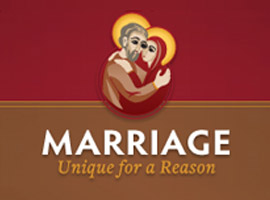Last week’s disappointing and troublesome Supreme Court decision that imposes a false definition of marriage on all 50 states was not surprising or unexpected. Many are celebrating. However, Friday’s ruling by nine unaccountable judges is nevertheless an attempt to overrule the natural law, discoverable to all men and women through reason.
Arlington Bishop Paul Loverde and Richmond Bishop Francis DiLorenzo expressed their deep disappointment in the decision, saying of marriage, “This fundamental institution, grounded in natural law, predates any religion or nation….Marriage is the only institution uniting one man and one woman with each other and with any child who comes from their union….Redefining marriage furthers no one’s rights, least of all those of children.”
Echoing Virginia’s Bishops, Archbishop Joseph E. Kurtz of Louisville, president of the U.S. Conference of Catholic Bishops, called the decision a “tragic error,” saying, “Regardless of what a narrow majority of the Supreme Court may declare at this moment in history, the nature of the human person and marriage remains unchanged and unchangeable….It is profoundly immoral and unjust for the government to declare that two people of the same sex can constitute a marriage. The unique meaning of marriage as the union of one man and one woman is inscribed in our bodies as male and female.”
Pope Francis has clearly taught our need to uphold the truth about marriage. “The family is threatened by growing efforts on the part of some to redefine the very institution of marriage, by relativism, by the culture of the ephemeral, by a lack of openness to life,” he said. “These realities are increasingly under attack from powerful forces, which threaten to disfigure God’s plan for creation.”
Over the past several days, civic and Church leaders and others have expressed fears about the implications for religious liberty since the Court has now decreed same-sex marriage is a “fundamental right.” Justice Kennedy, writing for the majority, sought to assuage those fears. He wrote, “The First Amendment ensures that religious organizations and persons are given proper protection as they seek to teach the principles that are so fulfilling and so central to their lives and faiths, and to their own deep aspirations to continue the family structure they have long revered.” But Chief Justice Roberts, noting Kennedy’s use of the words “advocate” and “teach”, was not convinced. “The First Amendment guarantees, however, the freedom to ‘exercise’ religion. Ominously, that is not a word the majority uses,” Roberts observed.
We do not know the battles that lie ahead, but more than a decade ago Pope St. John Paul II exhorted the faithful to stand firm. “[C]lear and emphatic opposition is a duty.” At the same time, our faith compels us to treat charitably our brothers and sisters in Christ who experience same-sex attractions and those who disagree with us on this issue. “Catholic teaching regarding marriage is not a judgment about persons who experience same-sex attraction,” said Bishop Joseph Bambera of Scranton, “but a statement about how the Church has always understood the nature of marriage itself….Like every person, our gay brothers and sisters – members of our families, our communities and our churches – are beloved children of God who deserve to be treated with respect, dignity and compassion.”
Let us call upon the Holy Spirit for strength and wisdom as we join our Pope, Bishops and priests in proclaiming the truth about marriage fearlessly and with great love, and let’s model a culture of authentic marriage, family and civility through our lives and actions.
